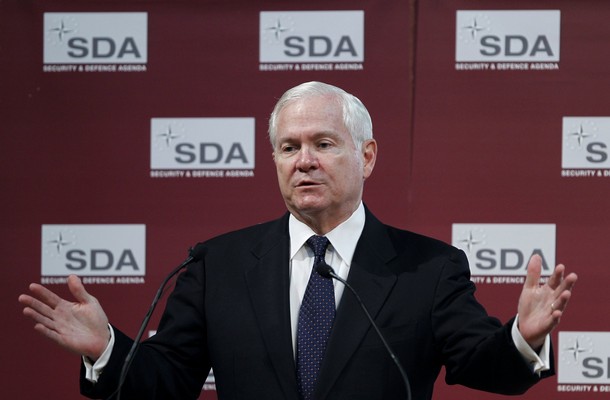
From Jim Garamone, American Forces Press Service: NATO has turned into a two-tiered alliance of members who consume security and those who produce it, Defense Secretary Robert M. Gates said here today. . . .
"In the past, I’ve worried openly about NATO turning into a two-tiered alliance between members who specialize in ‘soft’ humanitarian, development, peacekeeping and talking tasks and those conducting the ‘hard’ combat missions — between those willing and able to pay the price and bear the burdens of alliance commitments, and those who enjoy the benefits of NATO membership, be they security guarantees or headquarters billets, but don’t want to share the risks and the costs,” the secretary said.
“This is no longer a hypothetical worry,” he added. “We are there today. And it is unacceptable. . . .”
NATO operations in Afghanistan have exposed serious alliance shortcomings in military capabilities and in political will, Gates said. “Despite more than 2 million troops in uniform – not counting the U.S. military – NATO has struggled, at times desperately, to sustain a deployment of 25,000 to 45,000 troops — not just in boots on the ground, but in crucial support assets such as helicopters; transport aircraft; maintenance; intelligence, surveillance and reconnaissance; and much more,” he said.
The NATO operation over Libya shows an even greater lack of resources and will, Gates said. . . .
“While the operation has exposed some shortcomings caused by underfunding,” the secretary said, “it has also showed the potential of NATO, with an operation where Europeans are taking the lead with American support.
“However, while every alliance member voted for the Libya mission, less than half have participated, and fewer than a third have been willing to participate in the strike mission,” he continued. “Frankly, many of those allies sitting on the sidelines do so not because they do not want to participate, but simply because they can’t. The military capabilities simply aren’t there.”
Allies do not have intelligence, surveillance, and reconnaissance assets that would allow more allies to be involved and make an impact, Gates said. To run the air campaign, the NATO air operations center in Italy required a major augmentation of targeting specialists, mainly from the United States, to do the job – a “just in time” infusion of personnel that may not always be available in future contingencies, the secretary said.
“We have the spectacle of an air operations center designed to handle more than 300 sorties a day struggling to launch about 150,” he said. “Furthermore, the mightiest military alliance in history is only 11 weeks into an operation against a poorly armed regime in a sparsely populated country – yet many allies are beginning to run short of munitions, requiring the U.S., once more, to make up the difference.” (photo: Reuters)
Image: reuters%206%2010%2011%20Robert%20Gates%20SDA1.jpg
